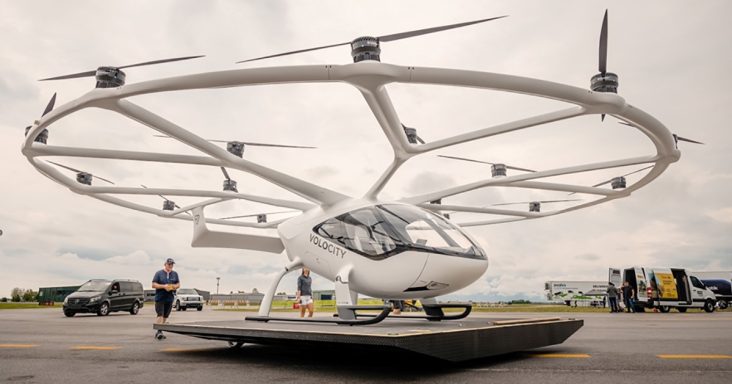$412K Walton grant to UA focuses on smart mobility
by July 31, 2022 11:21 am 2,428 views

Volocopter's VoloCity electric air taxi model was on display at the UP.Summit earlier this summer in Bentonville.
A $412,000 planning grant from the Walton Family Charitable Support Foundation to the University of Arkansas will support the college’s vision of becoming the preeminent university in smart mobility.
The funding will span eight months and support pilot research studies, industry and peer benchmarking, content marketing, and education and workforce development planning.
The university’s targeted smart mobility innovation areas include next-generation vehicles, unmanned aerial mobility and artificial intelligence for smart mobility.
Heather Nachtmann, an associate dean of engineering at the UA, is leading the campus-wide planning effort.
“As the emerging field of smart mobility progresses, it is critical to develop our comprehensive vision now to leverage our competitive edge in this rapidly evolving industry,” Nachtmann said in a statement. “We have all the critical components — strategic industry partners, an innovative ecosystem and world-renowned experts. This planning grant will enable the university to elevate our existing capacity into a transformational vision to drive smart mobility workforce development and innovation.”
Earlier this year, Gov. Asa Hutchinson appointed Nachtmann to the Arkansas Council on Future Mobility. It includes representatives from Walmart, Canoo, J.B. Hunt Transport Services, Entergy, Arkansas Trucking Association, Arkansas Auto Dealers Association and multiple state agencies.
The UA said more than 50 faculty specialize in supply chain and transportation education and research.
UA vice chancellor for economic development Mike Malone said the grant will provide a roadmap for the university’s and state’s shared goal of being the epicenter of smart mobility.
“These technologies have the potential to transform traditional supply chains and business models,” he said. “By aligning our talent, resources and programs with public and industry partners we will establish our state as the hub for smart mobility business, innovation and workforce development.”
